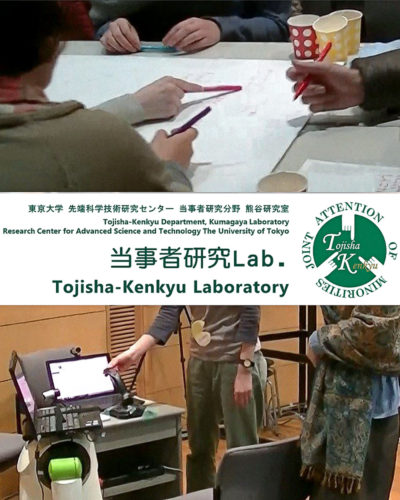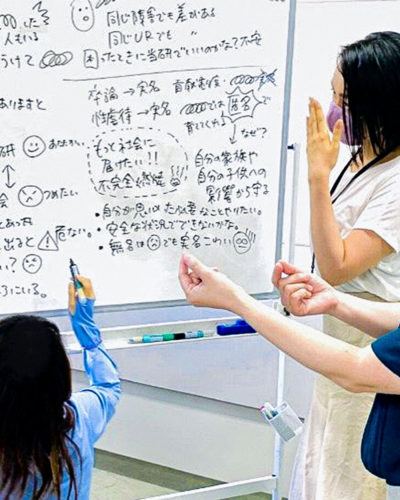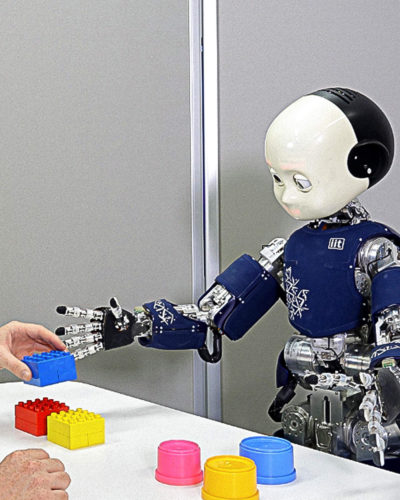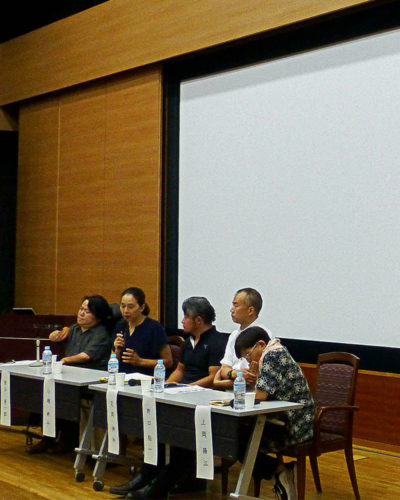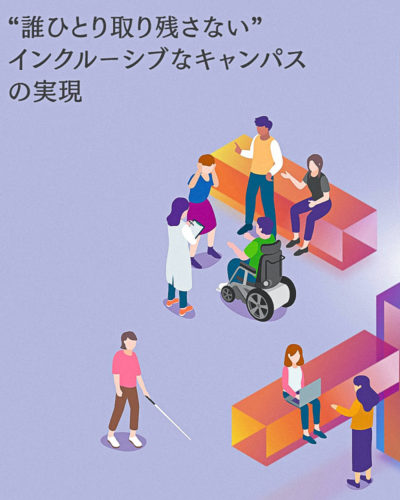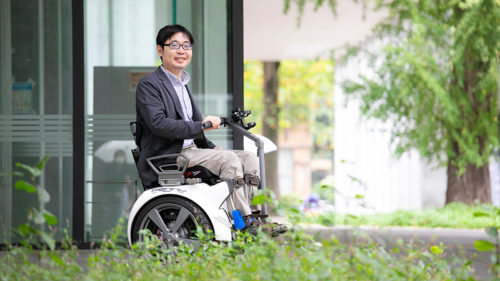List of researches on #Kumagaya Laboratory
-
kumagaya researches Kumagaya Research No. 6
Studying our own problems as research themes
Tojisha-kenkyu Laboratory
Kumagaya LaboratoryIn tojisha-kenkyu, individuals facing various challenges, such as disabilities, illnesses, poverty, parenting difficulties, and difficulties at work, study the mechanisms and coping methods alongside peers who are experiencing similar challenges, rather than leaving the analysis process to specialists and support providers.
-
kumagaya researches Kumagaya Research No. 5
A tojisha-kenkyu group for people with neurodiversity, by people with neurodiversity
Tojisha-kenkyu Laboratory
Kumagaya LaboratoryThrough this tojisha-kenkyu group launched in 2011, more than 2,700 people with developmental disabilities have shared their own experiences, difficulties, and steps taken in their lives, and where approval was obtained, their stories have been recorded. The Otoemojite disagrees with the idea that there are “people with communication disorders” and “ordinary people.” Instead, we believe, based on the social model of disability, that “communication disorders” arise between people whose physical characteristics align with the shared culture and rules of the majority, and a minority of people whose physical characteristics do not easily fit this mold.
-
kumagaya researches no.04
From involvement to centrality: Research only “we” can do
Tojisha-kenkyu Laboratory
Kumagaya LaboratoryWe introduced a user-researcher employment system over a wide range of disabilities for the first time in Japan. The system aims to bring research that utilizes the perspectives of people with disabilities into academia and has been implemented in the area of mental illness in countries such as the United Kingdom. Ms. Makino, who is deaf signer, was selected for a grant by the Foundation for Promoting Personal Mobility and Ecological Transportation (Eco-Mo Foundation) to develop an in-flight comfort scale, and Ms. Hirokawa is carrying out action research on information support for performing arts, including barrier-free theatrical performances.
-
kumagaya researches no.03
Participatory research on autism spectrum disorder
Tojisha-kenkyu Laboratory
Kumagaya LaboratoryWe are using experimental psychological techniques to test some hypotheses about physical and cognitive diversity derived from tojisha-kenkyu of people with autism spectrum disorder (ASD), and exploring conditions for a social environment that is inclusive of different neurodivergent peoples. We have also developed an ASD Perception Experience Simulator, which allows users to have the kind of audiovisual experiences reported by people with ASD, and are currently verifying its effectiveness in reducing stigma.
-
kumagaya researches Kumagaya Research No. 2
Inclusive workplaces where everyone plays an important role
Tojisha-kenkyu Laboratory
Kumagaya LaboratoryOrganizational cultures in which members can fulfil their potential are of universal importance. Our tojisha-kenkyu is based on the theme of correctly understanding ourselves and the slogan “experience is treasure.” Here, the group works as a whole to share information on “vulnerability,” including symptoms, hardships, and failure experiences, studying the mechanisms behind these hardships as well as methods of coping with them.
-
kumagaya researches no.01
The overlooked difficulties of athletes, and what we can learn from them
Tojisha-kenkyu Laboratory
Kumagaya LaboratoryTop athletes may find it difficult to build new life goals after peak periods or retirement from active sports, because the extreme focus on performance and competition has a depleting effect on their bodies and minds. It is therefore important to think about supporting athletes not only from the short-term perspective of improving performance and winning medals, but on a long-term, holistic basis.
-
kumagaya ・ namiki researches Kumagaya & Namiki Research No. 3
Working together to build a campus for all
Tojisha-kenkyu Laboratory
Kumagaya ・ Namiki LaboratoryUntil now, people with disabilities and other minorities have been positioned as research subjects; however, they have rarely been the ones conducting the studies. In this project, we work with several organizations within the university, including the Disability Services Office, the Environmental Science Center, and the Center for Research and Development of Higher Education to create an academic climate where diverse individuals can participate in research activities. The project aims to realize an inclusive campus where no one is left behind by proposing the design of university institutions—“knowledge factories”—from the perspective of people with disabilities and other difficulties, taking in both the “structure” of the institution (the institutional and physical environment) and its “culture” (the customs and attitudes rooted in people’s values).
-
namiki ・ kumagaya researches Namiki & Kumagaya Research No. 2
Barrier-free laboratories
Inclusive Design Laboratory
Namiki ・ Kumagaya LaboratoryDespite aspiring to work in science or engineering, many students change their career paths because of the barriers they face. Although know-how has been accumulated on support for university students with disabilities in the area of assistance during lectures, in science and engineering courses support has lagged behind for experiments and practical training, for which physical sensory and motor functions are required.
-
namiki ・ kumagaya researches Namiki & Kumagaya Research No. 1
Tools to support constructive dialogue
Inclusive Design Laboratory
Namiki ・ Kumagaya LaboratoryTo examine specific details of reasonable accommodation for students and researchers with disabilities, it is a legal requirement that constructive dialogue be held between the faculty member in charge of the laboratory and the person with the disability, which must also consider the person’s diagnosis, activities of daily living (ADL), and other aspects of the disability. We create worksheets as a tool to assist this process of dialogue by which reasonable accommodation is determined.
